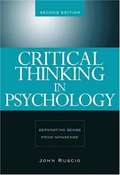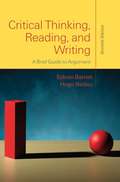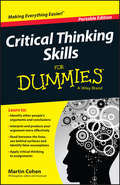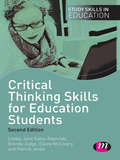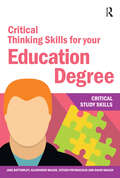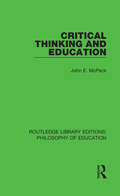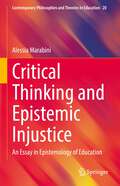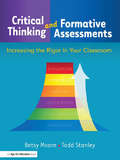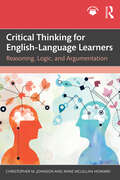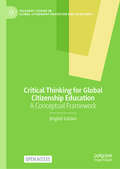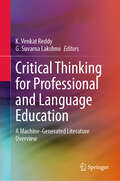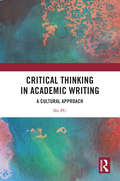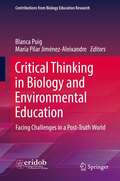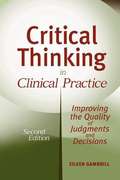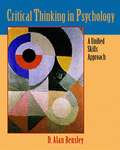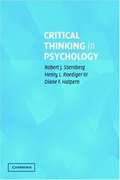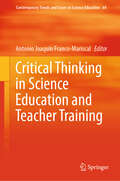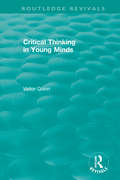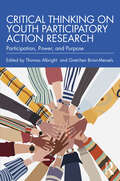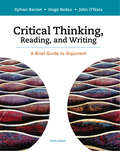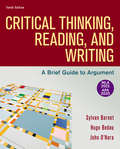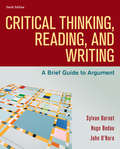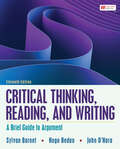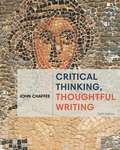- Table View
- List View
Critical Thinking In Psychology: Separating Sense From Nonsense
by John RuscioDo your students have the tools to distinguish between the true science of human thought and behavior from pop psychology? John Ruscio's book provides a tangible and compelling framework for making that distinction. Because we are inundated with "scientific" claims, the author does not merely differentiate science and pseudoscience, but goes further to teach the fundamentals of scientific reasoning on which students can base their evaluation of information.
Critical Thinking Reading and Writing: A Brief Guide to Argument (7th edition)
by Sylvan Barnet Hugo BedauCritical Thinking, Reading, and Writing is a compact but complete guide to critical thinking and argumentation. Comprising the text portion of the widely adopted Current Issues and Enduring Questions, it draws on the authors' dual expertise in effective persuasive writing and comprehensive rhetorical strategies to help students move from critical thinking to argumentative and researched writing. With comprehensive coverage of classic and contemporary approaches to argument, including Aristotle, Toulmin, and a range of alternative views, as well as 35 readings and a casebook on the state and the individual, it is an extraordinarily versatile text. This affordable guide can stand alone or supplement a larger anthology of readings.
Critical Thinking Skills For Dummies
by Martin CohenTurbocharge your reasoning with Critical Thinking Just what are the ingredients of a great argument? What is the secret to communicating your ideas clearly and persuasively? And how do you see through sloppy thinking and flim-flam? If you’ve ever asked any of these questions, then this book is for you! These days, strong critical thinking skills provide a vital foundation for academic success, and Critical Thinking Skills For Dummies offers a clear and unintimidating introduction to what can otherwise be a pretty complex topic. Inside, you'll get hands-on, lively, and fun exercises that you can put to work today to improve your arguments and pin down key issues. With this accessible and friendly guide, you'll get plain-English instruction on how to identify other people's assumptions, methodology, and conclusions, evaluate evidence, and interpret texts effectively. You'll also find tips and guidance on reading between the lines, assessing validity – and even advice on when not to apply logic too rigidly! Critical Thinking Skills for Dummies: Provides tools and strategies from a range of disciplines great for developing your reflective thinking skills Offers expert guidance on sound reasoning and textual analysis Shows precisely how to use concept mapping and brainstorming to generate insights Demonstrates how critical thinking skills is a proven path to success as a student Whether you're undertaking reviews, planning research projects or just keen to give your brain a workout, Critical Thinking Skills For Dummies equips you with everything you need to succeed.
Critical Thinking Skills for Education Students
by Patrick Jones Elaine Mccreery Brenda JudgeThis book will help education students develop their understanding of critical analysis. It outlines the skills needed to examine and challenge data and encourages an appreciation of how this way of thinking can enrich the personal and professional development of students. It gives clear definitions of key terms and examples of how to analyse data. The book sets out how Action Learning Sets can contribute to analytical skills and helps students develop self-evaluation skills in order to recognise personal values and perceptions. It will also help develop confidence in using critical analysis through modelling, case studies and reflective tasks.
Critical Thinking Skills for Education Students (Study Skills in Education Series)
by Patrick Jones Elaine Mccreery Brenda Judge Lesley-Jane Eales-ReynoldsRevised and extended to cover critical reflection and evaluation of information resources, this new edition of Critical Thinking Skills for Education Students is a practical and user-friendly text to help education students develop their understanding of critical analysis. It outlines the skills needed to examine and challenge data and encourages students to adopt this way of thinking to enrich their personal and professional development. The text helps students to develop their self-evaluation skills in order to recognise personal values and perceptions. Critical analysis, modeling, case studies, worked examples and reflective tasks are used to engage the reader with the text - building both skills and confidence. This book is part of the Study Skills in Education Series. This series addresses key study skills in the context of education courses, helping students identify their weaknesses, increase their confidence and realise their academic potential. Titles in this series are suitable for students on: any course of Initial Teacher Training leading to QTS; a degree in Education or Education Studies; a degree in Early Years or Early Childhood Education; a foundation degree in any education related subject discipline. Lesley-Jane Eales-Reynolds is Pro Vice Chancellor (Education) at Kingston University. Brenda Judge is a Senior Lecturer at Manchester Metropolitan University. Elaine McCreery is Head of Primary, Early Years and Education Studies programmes at Manchester Metropolitan University. Patrick Jones, now retired, was Senior Lecturer in Primary Education at Manchester Metropolitan University.
Critical Thinking Skills for your Education Degree (Critical Study Skills)
by Kulwinder Maude David Waugh Jane Bottomley Steven PryjmachukCritical Thinking Skills for your Education Degree provides you with a sound knowledge and understanding of: the nature of critical thinking, and its relevance and importance in HE how to adopt a critical approach to all aspects of your studies within education the importance of active, critical reading, and how it allows you an efficient, principled, effective assessment of the literature in your field the need to adopt a critical approach to writing, characterised by analytical and evaluative use of sources and the development of your own ‘voice’ If you are embarking on a university education or teaching degree, the books in this series will help you acquire and develop the knowledge, skills and strategies you need to achieve your goals. They provide support in all areas important for university study, including institutional and disciplinary policy and practice, self-management, and research and communication. Tasks and activities are designed to foster aspects of learning which are valued in higher education, including learner autonomy and critical thinking, and to guide you towards reflective practice in your study and work life.
Critical Thinking and Education: Dialogue And Dialectic (Routledge Library Editions: Philosophy of Education #12)
by John E. McPeckThe skills of ‘critical thinking’ occupy a contentious place in debates on education. It is of course widely recognised that education must consist of more than an unreasoning accumulation of facts and skills, and that modern society demands a highly-developed critical awareness to cope with its ever-increasing complexities. Yet the very term ‘critical thinking’ threatens to become a vague and unexamined slogan, displayed more in party tricks than in useful knowledge. In this book, first published in 1981, Professor McPeck offers a critique of the major ideas and important work in the field, including those of Ennis and de Bono, while at the same time presenting his own rigorous ideas on the proper place in critical thinking in the philosophy of education. The book aims to establish a sound basis on which the role of critical thinking in schools can be evaluated and the author makes a strong case for the contribution it can make to resolving current dilemmas of the curriculum.
Critical Thinking and Epistemic Injustice: An Essay in Epistemology of Education (Contemporary Philosophies and Theories in Education #20)
by Alessia MarabiniThis book argues that the mainstream view and practice of critical thinking in education mirrors a reductive and reified conception of competences that ultimately leads to forms of epistemic injustice in assessment. It defends an alternative view of critical thinking as a competence that is normative in nature rather than reified and reductive. This book contends that critical thinking competence should be at the heart of learning how to learn, but that much depends on how we understand critical thinking. It defends an alternative view of critical thinking as a competence that is normative in nature rather than reified and reductive. The book draws from a conception of human reasoning and rationality that focuses on belief revision and is interwoven with a Bildung approach to teaching and learning: it emphasises the relevance of knowledge and experience in making inferences.The book is an enhanced, English version of the Italian monograph Epistemologia dell’Educazione: Pensiero Critico, Etica ed Epistemic Injustice.
Critical Thinking and Formative Assessments: Increasing the Rigor in Your Classroom
by Todd Stanley Betsy MooreDevelop your students' critical thinking skills and prepare them to perform competitively in the classroom, on state tests, and beyond. In this book, Moore and Stanley show you how to effectively instruct your students to think on higher levels, and how to assess their progress. As states implement the Common Core State Standards, teachers have been called upon to provide higher levels of rigor in their classrooms. Moore and Stanley demonstrate critical thinking as a key approach to accomplishing this goal. They explore the benefits of critical thinking and provide the tools you need to develop and monitor critical thinking skills in the classroom. Topics include: The Difference Between Higher-Level and Lower-Level Thinking Writing Higher-Level Thinking QuestionsAssessing Critical Thinking Strategies to Develop Higher-Level Thinking Skills
Critical Thinking for English-Language Learners: Reasoning, Logic, and Argumentation
by Christopher M. Johnson Anne McLellan HowardCritical Thinking for English-Language Learners is an accessible introduction to critical thinking and the use of informal logic for learners of English. Critical thinking skills are key to helping students learn how to reason in English. By developing informal logic skills, students can develop their critical thinking abilities to better assess why different types of arguments are successful or unsuccessful.The textbook: introduces key concepts in critical thinking, informal logic, and argumentation; supports the development of students’ language ability by including chapter English notes which show how to express logical connections in English and give a deeper understanding of English vocabulary; provides step-by-step guidance on how to make and critique different types of arguments, and how to understand connections between ideas and their various implications; includes pre-reading questions, activities, and exercises in each chapter; is supported by a series of PowerPoint presentations, extra review exercises, and instructor resources online Providing students with key skills to make and critique arguments in English, this book is a key resource for beginning and intermediate learners of English studying Critical Thinking, English for Academic Purposes, and Introduction to Philosophy.
Critical Thinking for Global Citizenship Education: A Conceptual Framework (Palgrave Studies in Global Citizenship Education and Democracy)
by Brighid GoldenThis open access book shares a two-part conceptual framework for critical global learning which weaves together theory and practice. The author shares the outcomes of her research and experiences developing students&’ critical thinking skills within the context of global citizenship education. While rooted in literature and research findings, the book is personal and reflexive, as the author shares her experiences as a teacher trying, and sometimes failing, to support critical thinking development which allows readers to reflect on their own practice. The book will be of interest to academics working in higher education, initial teacher education, and global citizenship education.
Critical Thinking for Professional and Language Education: A Machine-Generated Literature Overview
by K. Venkat Reddy G. Suvarna LakshmiThis book is the result of a collaboration between a human editor and an artificial intelligence algorithm to create a machine-generated literature overview of research articles analyzing importance of critical thinking in Educational Settings. It’s a new publication format in which state-of-the-art computer algorithms are applied to select the most relevant articles published in Springer Nature journals and create machine-generated literature reviews by arranging the selected articles in a topical order and creating short summaries of these articles. This book is a comprehensive guide to critical thinking research in education. It explores different definitions of critical thinking and its importance in specialized fields like business, engineering, and science. Presenting research on assessment, this resource delves into the integration of ICT tools for teaching critical thinking. With practical tools, strategies and tasks to develop critical thinking skills, thisbook is intended for researchers, educators, and those seeking to improve their critical thinking abilities.
Critical Thinking in Academic Writing: A Cultural Approach
by Shi PuThe book inquires into critical thinking through a cultural approach. Based on an 8-month ethnographic study, it compares Chinese postgraduate students’ conceptualisations and applications of critical thinking in three different settings in China and the UK. From an insider’s perspective, it analyses the intricate interplay of multiple cultural and individual factors that conditions students’ critical thinking development as they learn to write an academic thesis and to manage postgraduate learning. The book offers insights into the nature of problems that Chinese students encounter with critical thinking and envisions possibilities for the ideas for critical thinking to have a transformative power in an intercultural space. The book will primarily be of interest to academics and educators who work on critical thinking and academic writing, especially those who work with Chinese students. Scholars interested in intercultural issues in higher education may also find it relevant.
Critical Thinking in Biology and Environmental Education: Facing Challenges in a Post-Truth World (Contributions from Biology Education Research)
by Blanca Puig María Pilar Jiménez-AleixandreThis volume seeks to broaden current ideas about the role of critical thinking (CT) in biology and environmental education considering educational challenges in the post-truth era. The chapters are distributed into three sections, perspectives of a theoretical character (part I), empirical research about CT in the context of biology and health education (part II), and empirical research on CT in the context of environmental and sustainability education (part III). The volume includes studies reporting students’ engagement in the practice of critical thinking, and displays how CT can be integrated in biology and environmental education and why biology and environmental issues are privileged contexts for the development of CT. The chapters examine a range of dimensions of CT, such as skills, dispositions, emotions, agency, open-mindedness, or personal epistemologies. In addition, they explore topics such as climate change, sustainable diets, genetically modified food, vaccination, acceptance of evolution, homeopathy, and gene cloning. Concluding remarks regarding the connections between the chapters and future directions for the integration of critical thinking in biology and environmental education are presented in a final chapter.
Critical Thinking in Clinical Practice: Improving the Quality of Judgments and Decisions (2nd edition)
by Eileen GambrillDecisions are influenced by a variety of fallacies and biases that we can learn how to avoid. Critical thinking values, knowledge, and skills, therefore, are integral to evidence-based practice. These emphasize the importance of recognizing ignorance as well as knowledge and the vital role of criticism in discovering how to make better decisions. This book is for clinicians--clinicians who are willing to say "I don't know. " Critical Thinking in Clinical Practice, Second Edition is designed to enhance readers' skills in making well-informed, ethical decisions. Making such decisions is no easy task. Decisions are made in uncertain, changing environments with time pressures. Interested parties, such as the pharmaceutical industry, spend millions of dollars to influence decisions made. Drawing on a wide range of related literature, this book describes common pitfalls in clinical reasoning as well as strategies for avoiding them--sometimes called mind-tools. Mental health and allied professionals will come away from this text with knowledge of how classification decisions, a focus on pathology, and reliance on popularity can cause errors. Hazards involved in data collection and team decision making such as groupthink are discussed. Part 1 provides an overview of the context in which clinicians make decisions. Part 2 describes common sources of error, and Part 3 describes decision aids including the process of evidence-based practice. Part 4 describes the application of related content to different helping phases including assessment, intervention, and evaluation. Part 5 suggests obstacles to making well-informed decisions and how to encourage lifelong learning. This new Second Edition has been completely updated with expanded coverage on: * Evidence-based practice * Screening issues and practice errors * Lifelong learning * Problem solving * Decision making An interactive, dynamic book filled with insightful examples, useful lists and guidelines, and exercises geared to encourage critical thinking, Critical Thinking in Clinical Practice, Second Edition provides an essential resource for helping professionals and students.
Critical Thinking in Psychology
by D. Alan BensleyThis book was written for students and instructors who are serious about the improvement of critical thinking
Critical Thinking in Psychology
by Robert J. Sternberg Diane F. Halpern Henry L. RoedigerGood scientific research depends on critical thinking at least as much as factual knowledge; psychology is no exception to this rule. And yet, despite the importance of critical thinking, psychology students are rarely taught how to think critically about the theories, methods, and concepts they must use. This book shows students and researchers how to think critically about key topics such as experimental research, statistical inference, case studies, logical fallacies, and ethical judgments.
Critical Thinking in Science Education and Teacher Training (Contemporary Trends and Issues in Science Education #2)
by Antonio Joaquín Franco-MariscalThis edited volume explores the challenge of fostering critical thinking (CT) skills in science education, presenting the ENCIC-CT model as a framework for development. Named after the Science Education and Competences (Enseñanza de las Ciencias y Competencias, ENCIC) research group at the University of Malaga, Spain, this model emphasizes cultivating CT through socio-scientific issues and daily-life problems. It includes three key domains: knowledge, skills, and dispositions, each encompassing various dimensions addressed through scientific practices like argumentation, inquiry, and modeling. Teaching strategies such as gamification, role-playing, micro-debates, augmented reality, controversy mapping, and digital storytelling are highlighted. Spanning theoretical perspectives and practical experiences from early childhood to higher education, this book consolidates findings from the Spanish R&D project, “Citizens with Critical Thinking: A Challenge for Teachers in Science Education.” It is an essential resource for educators, researchers, and practitioners, offering valuable insights and practical applications for all educational levels.
Critical Thinking in Young Minds (Routledge Revivals)
by Victor QuinnHow do you protect young minds from the everyday bombardment of "tabloid culture" – the malign cultural influences which are so prevalent in today’s society? Originally published in 1997, stimulating and actively developing children’s philosophical and critical thinking is one answer and an area in which Victor Quinn had enjoyed extraordinary success. Here he conveys to teachers, through successful lesson plans, some of the ideas and techniques that lie behind his achievements, helping them to succeed in this vital area of education. for teachers of early years, primary and early secondary school pupils.
Critical Thinking on Youth Participatory Action Research: Participation, Power, and Purpose
by Thomas Albright Gretchen Brion-MeiselsThis book draws together insights on the past, present, and future of youth participatory action research (YPAR) through interviews with ten scholars whose work has been central to the field. In this critical moment, it allows readers to hear from scholars who have been foundational to the visioning and enacting of YPAR projects, as they reflect on the fundamental tenets and boundaries of their work.By engaging directly with leaders in the field, the book allows readers to explore many of the nuances, roots, and tensions of youth participatory action research. Throughout their conversations with scholars, Albright and Brion-Meisels pose three questions: What is the purpose of YPAR, and how does it get defined? What makes for authentic participation, both on the research team itself and in the process of the research? And how, if at all, does YPAR investigate and seek to dismantle existing power structures within schools and communities? In taking an intentionally dialectical approach, this volume builds on the centrality of dialogue in PAR/YPAR processes, both in terms of pedagogy/mode and in terms of content/matter. By sharing direct excerpts of conversations, readers can participate in the co-construction of knowledge, and gain more nuanced understandings of how purpose, participation, and power have shaped the foundations of YPAR, and how they might shape future collaborations.Elucidating the knowledge and perspective of leading YPAR practitioners, this timely book will be crucial reading on Research Methods and Education for Participatory Action Research programs and related courses.
Critical Thinking, Reading, and Writing
by Sylvan Barnet Hugo Bedau John O’haraCritical Thinking, Reading, and Writing is a compact but complete guide to critical thinking and argumentation. Comprising the text portion of the widely adopted Current Issues and Enduring Questions, it draws on the authors’ dual expertise in effective persuasive writing and comprehensive rhetorical strategies to help students move from critical thinking to argumentative and researched writing. This extraordinarily versatile text includes comprehensive coverage of classic and contemporary approaches to argument, from Aristotelian to Toulmin, to a new chapter on rhetorical analysis of pop culture texts, as well as 35 readings (including e-Pages that allow students to take advantage of working with multimodal arguments on the Web), and a casebook on the state and the individual. This affordable guide can stand alone or supplement a larger anthology of readings.
Critical Thinking, Reading, and Writing with 2020 APA and 2021 MLA Updates: A Brief Guide to Argument
by John O'Hara Sylvan Barnet Hugo BedauThis ebook has been updated to provide you with the latest guidance on documenting sources in MLA style and follows the guidelines set forth in the MLA Handbook, 9th edition (April 2021).Critical Thinking, Reading, and Writing is a brief yet versatile resource for teaching argument, persuasive writing, and research. It makes argument concepts clear and gives students strategies to move from critical thinking and analysis to crafting effective arguments. Comprehensive coverage of classic and contemporary approaches to argument — Aristotelian, Toulmin, Rogerian, visual argument, and more — provides a foundation for nearly 50 readings on current issues, such as student loan forgiveness and gun violence, topics that students will want to engage with and debate. For today’s ever-increasingly visual learners who are challenged to separate what’s real from what’s not, new activities and visual flowcharts support information literacy, and newly annotated readings highlight important rhetorical moves. This affordable guide can stand alone or supplement a larger anthology of readings.
Critical Thinking, Reading, and Writing: A Brief Guide To Argument
by Sylvan Barnet Hugo Bedau John O’HaraCritical Thinking, Reading, and Writing is a brief yet versatile resource for teaching argument, persuasive writing, and research. It makes argument concepts clear and gives students strategies to move from critical thinking and analysis to crafting effective arguments. Comprehensive coverage of classic and contemporary approaches to argument ― Aristotelian, Toulmin, Rogerian, visual argument, and more ― provides a foundation for nearly 50 readings on current issues, such as student loan forgiveness and gun violence, topics that students will want to engage with and debate. For today’s ever-increasingly visual learners who are challenged to separate what’s real from what’s not, new activities and visual flowcharts support information literacy, and newly annotated readings highlight important rhetorical moves. This affordable guide can stand alone or supplement a larger anthology of readings.
Critical Thinking, Reading, and Writing: A Brief Guide to Argument
by John O'Hara Sylvan Barnet Hugo BedauThis affordable resource helps you think critically and craft effective arguments.
Critical Thinking, Thoughtful Writing, 6th Edition
by John ChaffeeEmphasizing that thinking well and writing well are invariably connected, CRITICAL THINKING, THOUGHTFUL WRITING, 6e delivers thorough coverage of the writing process, going beyond the traditional rhetoric to teach you how to evaluate sources, images, and arguments. This rhetoric with readings introduces the process of thinking critically as a powerful approach to writing, to critically evaluating electronic and visual media, and to life in general. Each chapter focuses on a critical-thinking skill--such as problem solving or analysis of complex issues--that is explored through Thinking-Writing Activities and thematically linked readings. Each of the readings challenges you to read actively, think critically, and then write about the readings. The Sixth Edition offers provocative new readings, a four-color interior design, expanded writing projects that help you fully interact with the writing process, annotations to student essays, and more in-chapter questions to help you reflect on the material.
